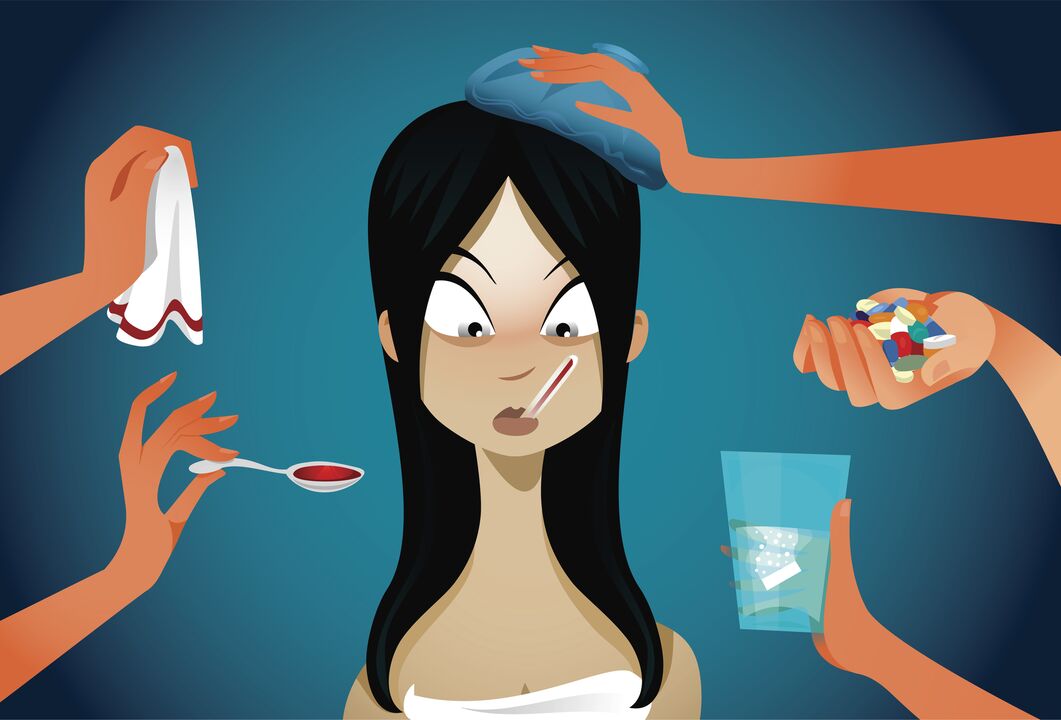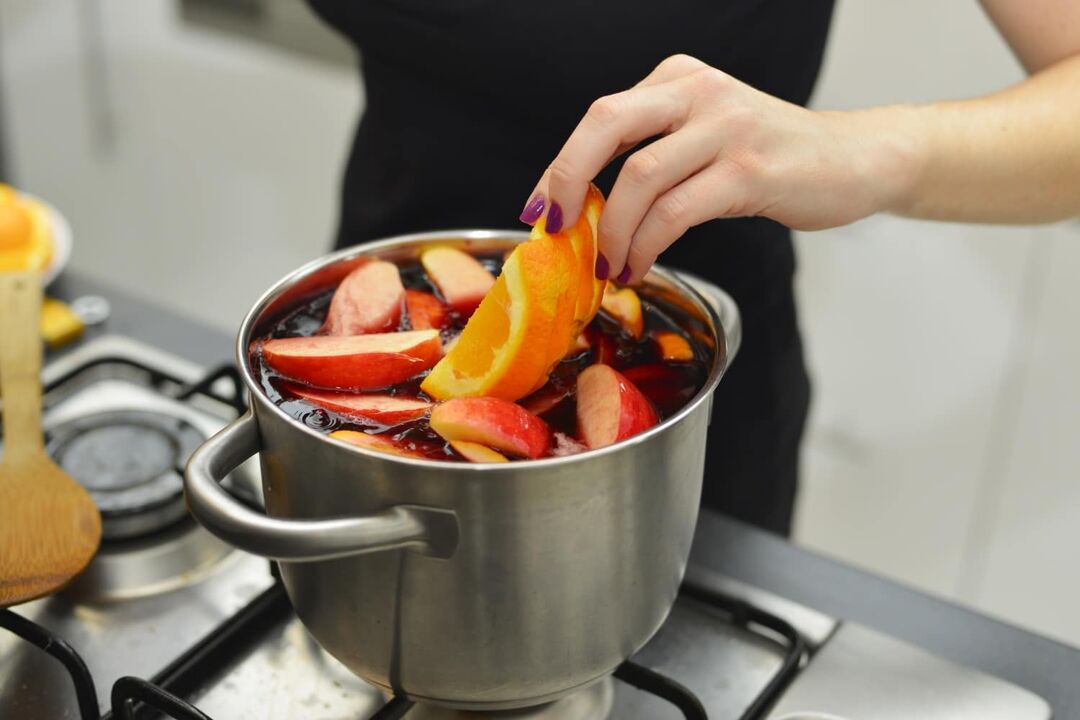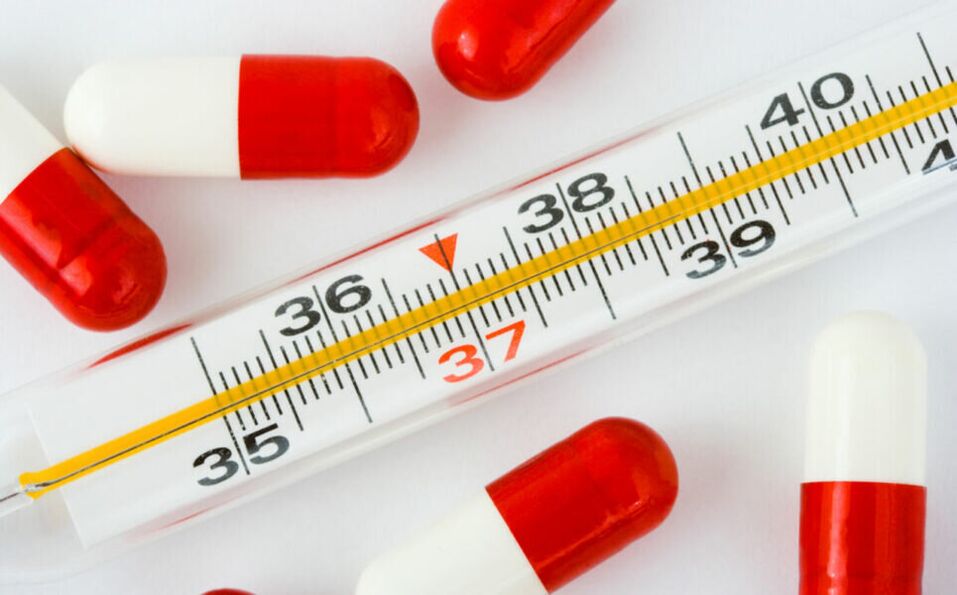Most of the population of our country firmly believes that during colds, the consumption of alcoholic beverages can significantly help the body on the road to recovery. But this is a big mistake. Ethanol not only won't help you get back on your feet faster, it can also hurt more. So can we drink alcohol at temperature during colds? We will need to fully understand this issue.

Ethyl alcohol and the common cold
The myth that alcohol helps the body cope with colds is based on a warming effect. But it seems to be, because after entering the bloodstream, ethanol causes vasodilation, which results in blood flow to the skin. A person feels heat, but such sensations are deceptive, since only the skin is warmed up, and heat energy is quickly released into the environment and causes heat loss.
It is strongly advised not to take alcohol in the cold. The false feeling of incipient heat is dangerous, the person does not feel the true temperature.
If you drink during a cold, oddly enough, viruses and bacteria will not scatter to the sides, but will continue to exist. Alcohol only negatively affects the functioning of the immune system, which weakens the body and prevents it from fighting infections. Systematic consumption of alcoholic beverages during illness will increase the number of pathogenic bacteria, so the course of the disease will only worsen.
But among doctors there is also an opinion that a glass of red wine can be an excellent prevention of colds. Considering that many do not know how to drink culturally, it is better not to think about such prevention.
Ethyl alcohol and temperature
An increase in temperature during illness is not a symptom, but rather a reaction of the body to an invasion of foreign agents. It is at high rates on the thermometer that the immune system is able to destroy pathogenic organisms. If the temperature does not exceed 38. 5 degrees, then you should not rush to bring it down, let the body fight and form immunity, but you should not interfere. And alcohol can become that obstacle.
In any condition, alcohol consumption is undesirable, but even more so in the presence of temperature. If, with readings between 37 and 37. 5 ° C, it is still not that dangerous, then when using a 38 thermometer, you do not need to risk your health. Alcohol and temperature are not compatible for the following reasons:
- When the temperature rises, the body suffers from a lack of water, so you need to drink plenty of fluids, and alcohol will only make the situation worse. Ethanol further dehydrates the body, making the disease more difficult.
- During illness, the body begins to function in emergency mode, the heart rate increases, and if you drink even during this period, the heart is under tremendous stress. The pulse quickens, blood pressure rises, the whole cardiovascular system is affected by alcohol.
- Drinking alcohol at high temperatures can cause unexpected bodily reactions. At the first moment, it may even decrease a little, but then it will increase even more and cause a deterioration in well-being.
It should always be remembered that not only a cold can be accompanied by a jump in temperature, but also more serious diseases. And drinking alcohol with them can be even more dangerous.
Why does alcohol cause a rise in temperature?
It's no secret that alcohol dilates blood vessels. But what are the reasons for the increase in temperature when consuming alcohol? Let's try to answer this question:
- Ethanol dilated the blood vessels, which can cause the temperature to rise.
- The body of some may perceive alcohol as an allergen and react accordingly with an increase in temperature, rashes.
- There are times when there is a congenital intolerance to ethanol, which can also increase the temperature.
- Alcohol intolerance can develop throughout life as a result of certain illnesses or allergic reactions accompanied by high fever.
- Remember that alcoholic beverages can contain various impurities that can cause an allergic reaction with a rise in temperature.
- Alcohol can cause stomach pain, gastrointestinal problems appear, which is accompanied by fever.
- Poisoning the body with ethanol and its decay products is another likely reason that after taking alcohol during a cold, thermometer readings will increase.
It is therefore better not to take risks and not test the strength of your body. Calling a doctor makes a lot more sense than trying to get better with alcohol.
Exceptions for alcohol consumption in colds
If the temperature does not exceed 37. 5 ° C, then you can afford to take alcohol, but only special. This applies to mulled wine. The drink is a wine warmed to 70 ° and associated with cinnamon, ginger and cloves. This drink supplies the body with useful substances and trace elements, which is important during illness. As for ethyl alcohol, when heated, it practically evaporates, therefore, its content in the finished drink is reduced to zero.
If there is a temperature, it is better to cool the mulled wine a little.
Beer can be used in place of wine, but the drink should also be well heated so that the ethanol molecules evaporate and add spices. Beer contains B vitamins, vitamin C. But don't get carried away, a glass of mulled wine or beer will suffice.

Basal temperature and alcohol
The basal temperature chart is often compiled by women who are trying to get pregnant. It is easy to track the timing of egg maturation, which increases the chances of fertilization. For greater accuracy, such a chart is fixed over a long period so that all deviations can be followed.
A woman should remember that drinking alcohol can dramatically affect basal temperature. The indicators 37. 1-37. 3 already symbolize that a new life is being born in a woman's body. Drinking alcohol can cause a false rise in temperature, and the indicators can not be considered reliable.
Is it possible to combine antipyretics and alcohol
A sane person understands that no medication should be taken at the same time as alcohol. This also applies to antipyretic drugs. What happens if you take alcohol and a fever pill? The following complications are possible:
- The likelihood of side effects increases several times. If they may not appear in a sober person, then in combination with ethanol the risk increases several times.
- Ethyl alcohol enhances the toxic effect of drugs on the liver, believe me, this organ will not thank you for such a gift.
- Even drinking beer during colds and antipyretic treatment is fraught with nausea and vomiting.
How long can I take tablets after taking alcohol? The answer may be: no sooner than in 4-6 hours, if a glass of wine has been taken. Naturally, with a large amount of alcohol consumed, the period of time should be even longer.

Complications and consequences of fever after alcohol
It turned out that alcohol does not lower the temperature, but rather raises it. This can lead to the following dire consequences:
- There is a risk of damage to the nervous system.
- Danger of severe dehydration, life threatening.
- Blood circulation is impaired.
- Blood pressure jumps.
- The blood becomes viscous and there is a risk of blood clots.
Do not delay calling a doctor if the temperature has not dropped for several days and is maintained at elevated levels. This situation becomes dangerous for the work of the whole organism. It is urgent to lower the temperature if:
- Convulsions are observed.
- The patient has chronic pathologies of the cardiovascular system.
- There are lung diseases in the diagnosis.
- There are pathologies of the nervous system and mental abnormalities.
- The patient suffers from diabetes mellitus.
It should be borne in mind that harm can be caused not only by alcohol taken internally, but also in the form of rubbing, and this is also often practiced. It is better to entrust the treatment of colds to specialists or proven remedies, and not to subject your body to even more tests.































